| Home > Policy > White Paper, Notice, Announcement > White Paper > JAPANESE GOVERNMENT POLICIESIN EDUCATION, SCIENCE, SPORTSAND CULTURE1998 > MENTAL AND PHYSICAL HEALTH AND SPORTS CHAPTER4 SECTION3 2 | ||
The XVIII Olympic Winter Games in Nagano,held for16days from7February1998to16February1998,was the largest Olympic Winter Games in history,with a record number of events,participating countries and participating athletes.In terms of results in competition,the performances of the Japanese team were outstanding.In total,the Japanese team won ten medals,including five golds,and23athletes finished between fourth and eighth place,the best results for Japan in the history of the Olympic Winter Games,creating great excitement among the Japanese and giving them dreams for the future.
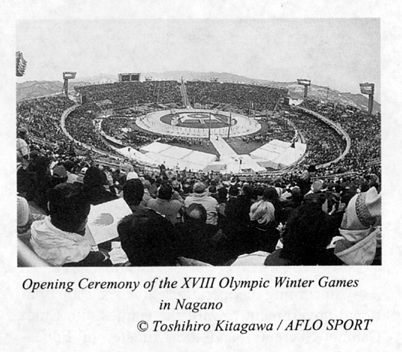
The principal preparation and operating body for the event was the Organizing Committee for the XVIII Olympic Winter Games,Nagano1998(NAOC).Those who cooperated in the event included related sports associations,NAOC,personnel of Nagano City,other municipalities involved and Nagano Prefecture,a vast number of management volunteers,and the national government.As a result of their preparation and management,event operations were carried out smoothly and the entire organization was highly praised by people from many countries,as well as the International Olympic Committee.
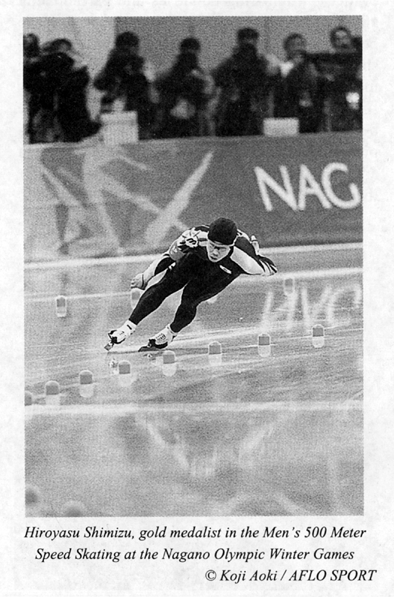
Concerning cooperation given by the na-tional government toward the Games,the Chief Cabinet Secretary and the Minister of Education,Science,Sports and Culture were appointed as NAOC Committee Members,to cooperate in the management.The Prime Minister's Office established the Council for Preparatory Measures for the Olympic Winter Games in Nagano with the Chief Cabinet Secretary as president,structured at administrative vice-ministerial level in related ministries and agencies,which established liaison and coordinated on areas relating to government measures for preparing for the event.
In addition,for the purpose of event support,the"Law Concerning Special Measures Necessary for Preparation for and Management of theNagano Olympic Winter Games"was legislated.Based on this,a postage stamp,from which aportion of the price was taken as contributiontoward the Games,was published,contributingin all approximately350million yen( see Table4-2 ).
Between FY1992 and1997MESSC subsidized the establishment of the six main venues which made up the Games'facilities(a total of34billion yen).Furthermore,in order to obtain wide understanding and cooperation from the Japanese people concerning the Winter Olympic Games,dissemination and informative education projects were developed from FY1993.In FY1993,a pamphlet aimed at elementary and lower secondary school students,To Come Together as One Flower From the World,was published and distributed in schools,followed by Peace,Friendship,Nature and Emotion,aimed at upper secondary school students and the general public in1994,and Olympic News in1995.In January1992the Winter Olympic Preparatory Office was established,followed in October1996by the Olympic Planning Director,Olympic Games,allowing for smooth preparation of the Games.

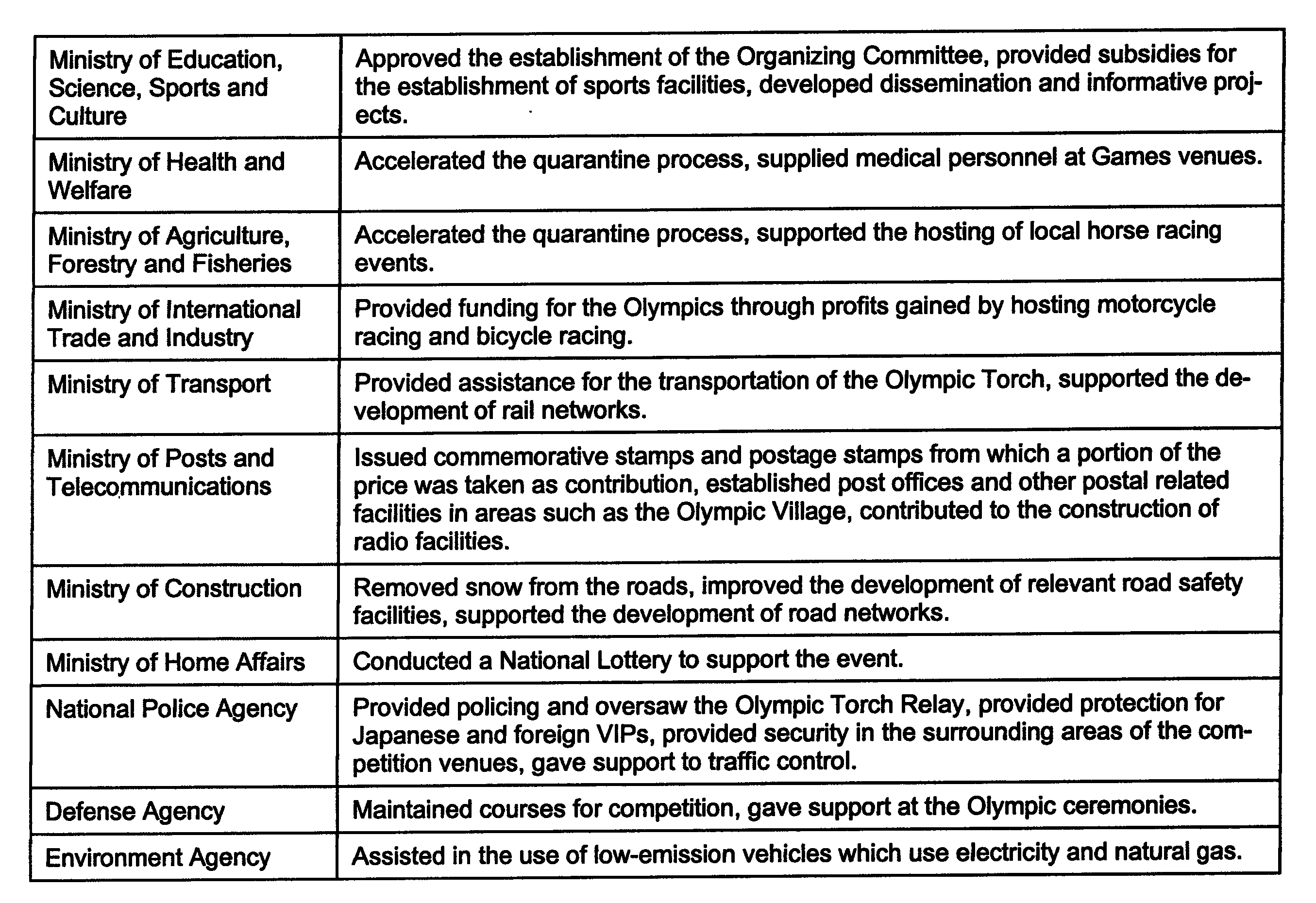
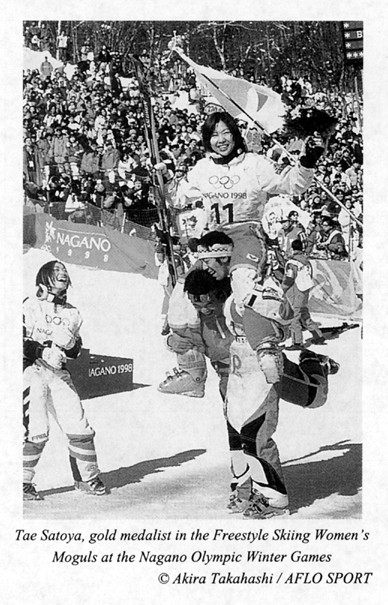
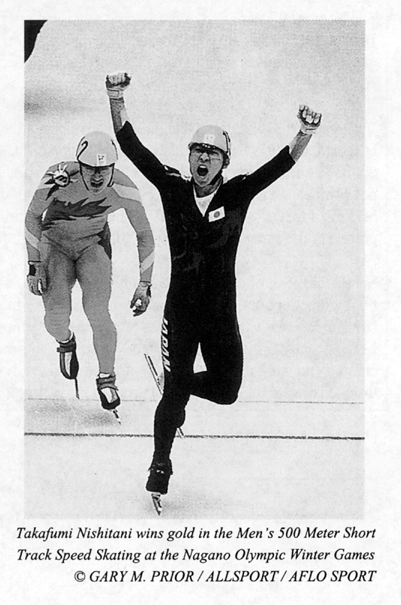
Furthermore,in August1997the city of Osaka was chosen as the Japanese candidate city for the2008Summer Olympics,and activities to bring the Olympic Games to Osaka will be developed in the near future.As was clearly witnessed during the Nagano Olympic Winter Games,the hosting of an Olympic Games is extremely significant both to the promotion of sports in Japan,and to the promotion of international goodwill.MESSC has pledged its full support toward activities to bring the2008Summer Olympic Games to Osaka,fully utilizing the experience of past Olympic invitation activities.The International Olympic Committee will make its final decision in2001over which city will host the Games.
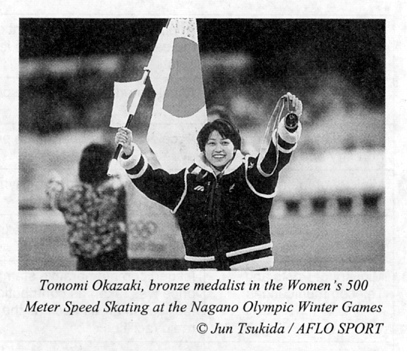
The1998Winter Paralympic Games in Nagano The Paralympic Games first began in1948,when they were introduced by Dr.Ludwig Guttmann at the Stoke Mandeville Hospital in England for the rehabilitation of patients.The competition,which was known as the Stoke Mandeville Games,was hosted in1960after the Summer Olympic Games in Rome,using the same competition facilities.This was the first Paralympic Games.It was decided as a rule to continue to host the Paralympic Games in years when Olympic Games were to be held,using the same venue.The Nagano Winter Paralympic Games were held after the XVIII Olympic Winter Games in Nagano,from5-14March1998inclusive.The Japanese athletes performed extremely well,winning41medals,including12golds.This left a strong impression on the Japanese people and went a considerable way to heightening understanding of,and interest in,sports for disabled persons.Various sporting events for the disabled are also held in Japan,including the National Sports Games for the Disabled,which is held after the autumn session of the National Athletic Meet(Kokutai),and the National Sports Games for Intellectual Disabilities(Yuaipikku).There are also events in which people without disabilities compete on a par with disabled persons.For example,at the10th National Sports and Recreation Festival held in Okinawa in November1997,there were88disabled participants who competed in events such as ground golf,Japanese-style croquet and target bird golf.Sports for the disabled should not only be considered as welfare measures,for example for the recovery of bodily functions and social participation,but also as fulfillment of the diverse needs of people,for example being able to enjoy sports as sports,and improving competitiveness through challenges.It is hoped that MESSC,the Ministry of Health and Welfare and other related ministries and agencies and general sport associations can work to promote sports for the disabled by cooperating closely with sports associations for the disabled toward the realization of normalization 2 in sports. |
??2??N Normalization The concept that a normal society is created by the disabled living the same kind of life as the able-bodied.
| Back to Top | MEXT HOME |